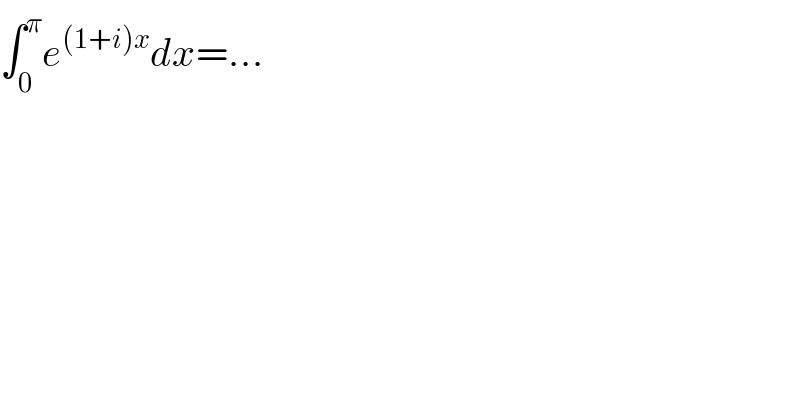Question Number 51215 by gunawan last updated on 25/Dec/18

$$\int_{\mathrm{0}} ^{\pi} {e}^{\left(\mathrm{1}+{i}\right){x}} {dx}=… \\ $$
Answered by tanmay.chaudhury50@gmail.com last updated on 25/Dec/18
![a=1+i ∫_0 ^π e^(ax) dx =(1/a)∣e^(ax) ∣_0 ^π =(1/a)(e^(aπ) −1) =(1/(1+i))(e^((1+i)π) −1) =((1−i)/2)[e^π e^(iπ) −1] [e^(iπ) =cosπ+isinπ=−1] =((1−i)/2)(−e^π −1) =((−1+i)/2)(e^π +1)](https://www.tinkutara.com/question/Q51247.png)
$${a}=\mathrm{1}+{i} \\ $$$$\int_{\mathrm{0}} ^{\pi} {e}^{{ax}} {dx} \\ $$$$=\frac{\mathrm{1}}{{a}}\mid{e}^{{ax}} \mid_{\mathrm{0}} ^{\pi} \\ $$$$=\frac{\mathrm{1}}{{a}}\left({e}^{{a}\pi} −\mathrm{1}\right) \\ $$$$=\frac{\mathrm{1}}{\mathrm{1}+{i}}\left({e}^{\left(\mathrm{1}+{i}\right)\pi} −\mathrm{1}\right) \\ $$$$=\frac{\mathrm{1}−{i}}{\mathrm{2}}\left[{e}^{\pi} {e}^{{i}\pi} −\mathrm{1}\right]\:\:\:\:\:\:\:\:\:\left[{e}^{{i}\pi} ={cos}\pi+{isin}\pi=−\mathrm{1}\right] \\ $$$$=\frac{\mathrm{1}−{i}}{\mathrm{2}}\left(−{e}^{\pi} −\mathrm{1}\right) \\ $$$$=\frac{−\mathrm{1}+{i}}{\mathrm{2}}\left({e}^{\pi} +\mathrm{1}\right) \\ $$$$ \\ $$
